Searched: Evangelicals
News
Migrant rights have been off-radar for many Panamanian Christians. But as pressures increase, some are speaking out ahead of this weekend's general elections.
 On May 5, Panamanians will vote for a new president. The outcome of this election may have consequences for far more than its 4.4 million residents; it could change the migration reality for the hundreds of thousands of people traveling from South America, Asia, and Africa who pass through the Central American country en route to the United States.Leading in the polls is José Raúl Mulino, a candidate for Realizando Metas (Realizing Goals), a right-wing populist party founded by disgraced president Ricardo Martinelli. He has vowed to shut down the Darién Gap, a densely forested jungle area that migrants must traverse to enter Panama from the bordering country of Colombia.“We’re going to close Darién and we’re going to repatriate every one of these people, respecting their human rights,” said Raúl Mulino in April.For many Panamanians, there was no migrant crisis before 2022. After passing through the Darién gap, migrants passed through the country on government buses to the Costa Rican border. But after a shift in US migrant policy sent many back to Central America a couple years ago, hundreds have since moved to Panama City and a handful of small towns. Residents have begun to blame them for crime and for overwhelming their sanitation systems.Though evangelicals have largely been on the sidelines, many leaders say they should have done more.“The church does not see the refugee problem as their own problem,” said Panamanian missionary Robert Bruneau, a regional leader with United World Mission. “They believe it is something the state should do and are not aware of the great opportunity they have to graciously and honorably serve someone who ...Continue reading... On May 5, Panamanians will vote for a new president. The outcome of this election may have consequences for far more than its 4.4 million residents; it could change the migration reality for the hundreds of thousands of people traveling from South America, Asia, and Africa who pass through the Central American country en route to the United States.Leading in the polls is José Raúl Mulino, a candidate for Realizando Metas (Realizing Goals), a right-wing populist party founded by disgraced president Ricardo Martinelli. He has vowed to shut down the Darién Gap, a densely forested jungle area that migrants must traverse to enter Panama from the bordering country of Colombia.“We’re going to close Darién and we’re going to repatriate every one of these people, respecting their human rights,” said Raúl Mulino in April.For many Panamanians, there was no migrant crisis before 2022. After passing through the Darién gap, migrants passed through the country on government buses to the Costa Rican border. But after a shift in US migrant policy sent many back to Central America a couple years ago, hundreds have since moved to Panama City and a handful of small towns. Residents have begun to blame them for crime and for overwhelming their sanitation systems.Though evangelicals have largely been on the sidelines, many leaders say they should have done more.“The church does not see the refugee problem as their own problem,” said Panamanian missionary Robert Bruneau, a regional leader with United World Mission. “They believe it is something the state should do and are not aware of the great opportunity they have to graciously and honorably serve someone who ...Continue reading... |
The Church of England enacted its “Prayers of Love and Faith" guidelines last December, that permits priests to bless same-sex couples but does not require them to do so. Many evangelicals within the Church of England, however, opposed the measure.
|
A late historian explores how crusade hymns told both the classic story of gospel salvation and the evolving story of evangelical worship music.
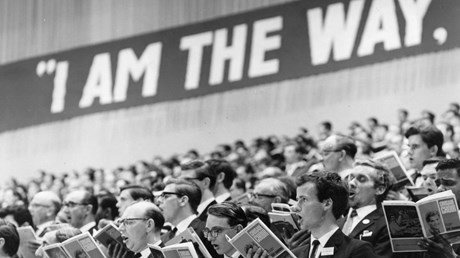 Crowds of over 50,000. Famous special guests. Hundreds of cities in the US and around the world. Beloved, catchy songs. For many, these might sound like readouts from the Taylor Swift Eras Tour hype machine. But exchange the glittery girl power for the gospel in baritone, and you have one of the most successful musical touring acts in the postwar world: the Billy Graham Crusades.The first association that “Billy Graham Crusade” may evoke is not musical at all, but rather a close-up shot of the evangelist, with his penetrating, wide-eyed gaze and raised forearms, thundering, “The Bible says …” Admittedly, music was not the main focus.Yet as the late historian Edith Blumhofer shows in her final book, Songs I Love to Sing: The Billy Graham Crusades and the Shaping of Modern Worship, neither Graham’s ministry nor the late-century rise of contemporary Christian music can be understood without it. As crusade song leader Cliff Barrows pursued his main goal—“sing to save”—he and his teammates bridged stylistic, cultural, and generational divides, transforming evangelicals’ music into the harmonic blend of old and new that is familiar today.Mining rich resourcesBefore unpacking this highly original book, a few words about the author. Blumhofer is an American religious historian renowned for her empathetic biographies of hymnist Fanny J. Crosby and evangelist Aimee Semple McPherson, as well as broader studies of evangelicalism and Pentecostalism. She concluded her career with this new study, sadly succumbing to a battle with cancer in the process.To finish the project, she tapped Jesus People expert Larry Eskridge, with whom she had for many years directed the Institute ...Continue reading... Crowds of over 50,000. Famous special guests. Hundreds of cities in the US and around the world. Beloved, catchy songs. For many, these might sound like readouts from the Taylor Swift Eras Tour hype machine. But exchange the glittery girl power for the gospel in baritone, and you have one of the most successful musical touring acts in the postwar world: the Billy Graham Crusades.The first association that “Billy Graham Crusade” may evoke is not musical at all, but rather a close-up shot of the evangelist, with his penetrating, wide-eyed gaze and raised forearms, thundering, “The Bible says …” Admittedly, music was not the main focus.Yet as the late historian Edith Blumhofer shows in her final book, Songs I Love to Sing: The Billy Graham Crusades and the Shaping of Modern Worship, neither Graham’s ministry nor the late-century rise of contemporary Christian music can be understood without it. As crusade song leader Cliff Barrows pursued his main goal—“sing to save”—he and his teammates bridged stylistic, cultural, and generational divides, transforming evangelicals’ music into the harmonic blend of old and new that is familiar today.Mining rich resourcesBefore unpacking this highly original book, a few words about the author. Blumhofer is an American religious historian renowned for her empathetic biographies of hymnist Fanny J. Crosby and evangelist Aimee Semple McPherson, as well as broader studies of evangelicalism and Pentecostalism. She concluded her career with this new study, sadly succumbing to a battle with cancer in the process.To finish the project, she tapped Jesus People expert Larry Eskridge, with whom she had for many years directed the Institute ...Continue reading... |
After lobbying from fellow Southern Baptists and Christians affected by the war, the House speaker moves a package forward.
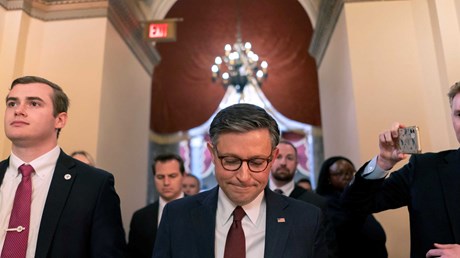 When deciding whether to protect his place in leadership as House speaker or go against his party to do what he believed was right, Mike Johnson turned to prayer.After weeks of hearing intelligence briefings and pleas from fellow Christians, Johnson ultimately sided with his convictions rather than conceding to the Republican Party’s isolationist wing. He backed a $95 billion foreign aid package that, despite the opposition of 112 GOP legislators, overwhelmingly passed the House of Representatives last weekend.Like many of his fellow Republicans, Johnson had initially opposed further aid to Ukraine, voting against it prior to becoming speaker and waiting months to move forward with an aid package after the Senate approved its version in February.He “went through a transformation,” according to one GOP colleague, House Foreign Affairs Committee chairman Michael McCaul. The shift may have come in part due to the influence of Ukrainian evangelicals, fellow Christian leaders, and his personal faith.“He got down on his knees, and he prayed for guidance and said, ‘Look, tell me. What is the right thing to do here?’” the Texas congressman told NOTUS’s Haley Byrd Wilt. The next day, Johnson said to McCaul, “I want to be on the right side of history.”The House vote on the Ukraine provisions, around $61 billion, was 311 to 112; a majority of Johnson’s colleagues voted against the measure, while aid to Israel and Taiwan had broader support. The Senate cleared the package Tuesday in a bipartisan 79–18 vote. Now the measure heads to President Joe Biden’s desk.Ukrainian leadership had grown more vocal about depleted weapons two years ...Continue reading... When deciding whether to protect his place in leadership as House speaker or go against his party to do what he believed was right, Mike Johnson turned to prayer.After weeks of hearing intelligence briefings and pleas from fellow Christians, Johnson ultimately sided with his convictions rather than conceding to the Republican Party’s isolationist wing. He backed a $95 billion foreign aid package that, despite the opposition of 112 GOP legislators, overwhelmingly passed the House of Representatives last weekend.Like many of his fellow Republicans, Johnson had initially opposed further aid to Ukraine, voting against it prior to becoming speaker and waiting months to move forward with an aid package after the Senate approved its version in February.He “went through a transformation,” according to one GOP colleague, House Foreign Affairs Committee chairman Michael McCaul. The shift may have come in part due to the influence of Ukrainian evangelicals, fellow Christian leaders, and his personal faith.“He got down on his knees, and he prayed for guidance and said, ‘Look, tell me. What is the right thing to do here?’” the Texas congressman told NOTUS’s Haley Byrd Wilt. The next day, Johnson said to McCaul, “I want to be on the right side of history.”The House vote on the Ukraine provisions, around $61 billion, was 311 to 112; a majority of Johnson’s colleagues voted against the measure, while aid to Israel and Taiwan had broader support. The Senate cleared the package Tuesday in a bipartisan 79–18 vote. Now the measure heads to President Joe Biden’s desk.Ukrainian leadership had grown more vocal about depleted weapons two years ...Continue reading... |
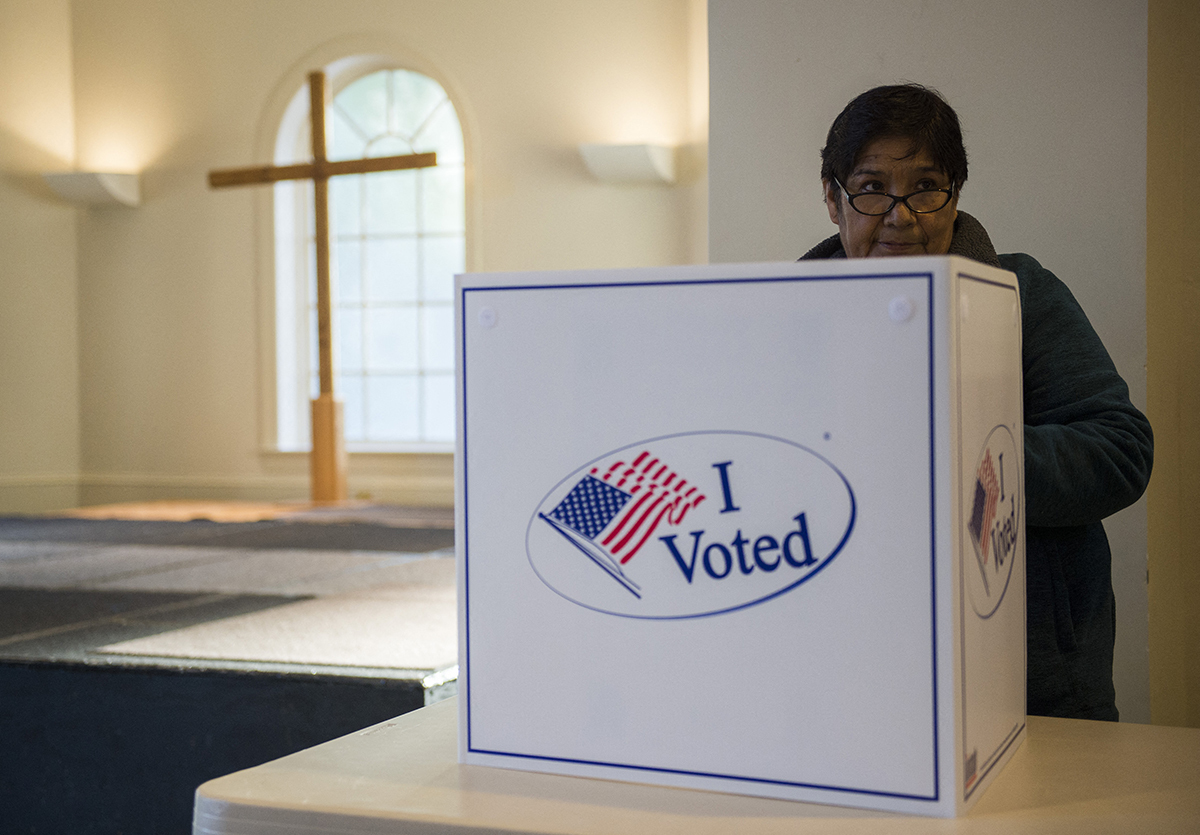 A new survey reveals that Evangelicals view immigration, American sovereignty and abortion as the top issues facing the United States heading into the 2024 presidential election. A new survey reveals that Evangelicals view immigration, American sovereignty and abortion as the top issues facing the United States heading into the 2024 presidential election. |
After lobbying from fellow Southern Baptists and Christians affected by the war, the House speaker moves a package forward.
 When deciding whether to protect his place in leadership as House speaker or go against his party to do what he believed was right, Mike Johnson turned to prayer.It had been weeks of hearing intelligence briefings and pleas from fellow Christians when Johnson ultimately sided with his convictions rather than conceding to the Republican Party’s isolationist wing. He backed a $95 billion foreign aid package that, despite the opposition of 112 GOP legislators, overwhelmingly passed the House of Representatives last weekend.Like many of his fellow Republicans, Johnson had initially opposed further aid to Ukraine, voting against it prior to becoming speaker and waiting months to move forward with an aid package after the Senate approved its version in February.He “went through a transformation,” according to one GOP colleague, House Foreign Affairs Committee chairman Michael McCaul. The shift may have come in part due to the influence of Ukrainian evangelicals, fellow Christian leaders, and his personal faith.“He got down on his knees, and he prayed for guidance and said, ‘Look, tell me. What is the right thing to do here?’” the Texas congressman told NOTUS’s Haley Byrd Wilt. The next day, Johnson said to McCaul, “I want to be on the right side of history.”The House vote on the Ukraine provisions, around $61 billion, was 311 to 112; a majority of Johnson’s colleagues voted against the measure, while aid to Israel and Taiwan had broader support. The Senate cleared the package Tuesday in a bipartisan 79–18 vote. Now the measure heads to President Joe Biden’s desk.Ukrainian leadership had grown more vocal about depleted weapons ...Continue reading... When deciding whether to protect his place in leadership as House speaker or go against his party to do what he believed was right, Mike Johnson turned to prayer.It had been weeks of hearing intelligence briefings and pleas from fellow Christians when Johnson ultimately sided with his convictions rather than conceding to the Republican Party’s isolationist wing. He backed a $95 billion foreign aid package that, despite the opposition of 112 GOP legislators, overwhelmingly passed the House of Representatives last weekend.Like many of his fellow Republicans, Johnson had initially opposed further aid to Ukraine, voting against it prior to becoming speaker and waiting months to move forward with an aid package after the Senate approved its version in February.He “went through a transformation,” according to one GOP colleague, House Foreign Affairs Committee chairman Michael McCaul. The shift may have come in part due to the influence of Ukrainian evangelicals, fellow Christian leaders, and his personal faith.“He got down on his knees, and he prayed for guidance and said, ‘Look, tell me. What is the right thing to do here?’” the Texas congressman told NOTUS’s Haley Byrd Wilt. The next day, Johnson said to McCaul, “I want to be on the right side of history.”The House vote on the Ukraine provisions, around $61 billion, was 311 to 112; a majority of Johnson’s colleagues voted against the measure, while aid to Israel and Taiwan had broader support. The Senate cleared the package Tuesday in a bipartisan 79–18 vote. Now the measure heads to President Joe Biden’s desk.Ukrainian leadership had grown more vocal about depleted weapons ...Continue reading... |
After lobbying from fellow Southern Baptists and Christians affected by the war, the House speaker moves a package forward.
 When deciding whether to protect his place in leadership as House speaker or go against his party to do what he believed was right, Mike Johnson turned to prayer.It had been weeks of hearing intelligence briefings and pleas from fellow Christians when Johnson ultimately sided with his convictions rather than conceding to the Republican Party’s isolationist wing. He backed a $95 billion foreign aid package that, despite the opposition of 112 GOP legislators, overwhelmingly passed the House of Representatives last weekend.Like many of his fellow Republicans, Johnson had initially opposed further aid to Ukraine, voting against it prior to becoming speaker and waiting months to move forward with an aid package after the Senate approved its version in February.He “went through a transformation,” according to one GOP colleague, House Foreign Affairs Committee chairman Michael McCaul. The shift may have come in part due to the influence of Ukrainian evangelicals, fellow Christian leaders, and his personal faith.“He got down on his knees, and he prayed for guidance and said, ‘Look, tell me. What is the right thing to do here?’” the Texas congressman told NOTUS’s Haley Byrd Wilt. The next day, Johnson said to McCaul, “I want to be on the right side of history.”The House vote on the Ukraine provisions, around $61 billion, was 311 to 112; a majority of Johnson’s colleagues voted against the measure, while aid to Israel and Taiwan had broader support. The Senate cleared the package Tuesday in a bipartisan 79–18 vote. Now the measure heads to President Joe Biden’s desk.Ukrainian leadership had grown more vocal about depleted weapons ...Continue reading... When deciding whether to protect his place in leadership as House speaker or go against his party to do what he believed was right, Mike Johnson turned to prayer.It had been weeks of hearing intelligence briefings and pleas from fellow Christians when Johnson ultimately sided with his convictions rather than conceding to the Republican Party’s isolationist wing. He backed a $95 billion foreign aid package that, despite the opposition of 112 GOP legislators, overwhelmingly passed the House of Representatives last weekend.Like many of his fellow Republicans, Johnson had initially opposed further aid to Ukraine, voting against it prior to becoming speaker and waiting months to move forward with an aid package after the Senate approved its version in February.He “went through a transformation,” according to one GOP colleague, House Foreign Affairs Committee chairman Michael McCaul. The shift may have come in part due to the influence of Ukrainian evangelicals, fellow Christian leaders, and his personal faith.“He got down on his knees, and he prayed for guidance and said, ‘Look, tell me. What is the right thing to do here?’” the Texas congressman told NOTUS’s Haley Byrd Wilt. The next day, Johnson said to McCaul, “I want to be on the right side of history.”The House vote on the Ukraine provisions, around $61 billion, was 311 to 112; a majority of Johnson’s colleagues voted against the measure, while aid to Israel and Taiwan had broader support. The Senate cleared the package Tuesday in a bipartisan 79–18 vote. Now the measure heads to President Joe Biden’s desk.Ukrainian leadership had grown more vocal about depleted weapons ...Continue reading... |
The American Solidarity Party is a small but growing alternative to the Trump-Biden race.
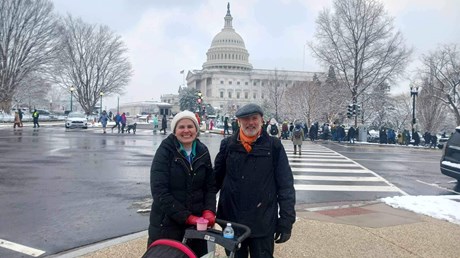 Charlie Richert would really like to stop voting for his dad.But in the last couple presidential election cycles, the 30-year-old attorney in Indianapolis has been unable to square his conscience with picking either the Republican or Democratic party nominee, so he’s resorted to writing in a name.“There’s no way I can escape having my faith inform how I vote,” said Richert, a nondenominational Christian who grew up Republican. “Unfortunately, we’ve been kind of stuck in a doom loop of candidates at the presidential level that I’ve just not felt comfortable voting for.”This year, he’s not drawn to alternatives like Robert F. Kennedy Jr. or Cornel West. “Maybe I’ll write in Abe Lincoln this year. Sorry to my dad, but a new name to write in would be fun,” he said.He recalls seeking to convince his classmates in an eighth-grade mock election that they should support Mitt Romney, but his chagrin with the Republican Party’s presidential nominee tracked with the ascension of Donald Trump.In a year when both major party presidential candidates are viewed unfavorably by a quarter of Americans, many find themselves less excited about the two options at the top of the ticket. But, like Richert, that doesn’t mean they’re ready to go for third-party options.The third-party candidates running in 2024 span the ideological spectrum, from independents Kennedy and Princeton University professor Cornel West to Green Party candidate Jill Stein. Then there are the more obscure party or candidate options—the Prohibition Party, Andrew Yang’s Forward Party, Maryland politician Jason Palmer, and that man in Texas who changed his name to “Literally ...Continue reading... Charlie Richert would really like to stop voting for his dad.But in the last couple presidential election cycles, the 30-year-old attorney in Indianapolis has been unable to square his conscience with picking either the Republican or Democratic party nominee, so he’s resorted to writing in a name.“There’s no way I can escape having my faith inform how I vote,” said Richert, a nondenominational Christian who grew up Republican. “Unfortunately, we’ve been kind of stuck in a doom loop of candidates at the presidential level that I’ve just not felt comfortable voting for.”This year, he’s not drawn to alternatives like Robert F. Kennedy Jr. or Cornel West. “Maybe I’ll write in Abe Lincoln this year. Sorry to my dad, but a new name to write in would be fun,” he said.He recalls seeking to convince his classmates in an eighth-grade mock election that they should support Mitt Romney, but his chagrin with the Republican Party’s presidential nominee tracked with the ascension of Donald Trump.In a year when both major party presidential candidates are viewed unfavorably by a quarter of Americans, many find themselves less excited about the two options at the top of the ticket. But, like Richert, that doesn’t mean they’re ready to go for third-party options.The third-party candidates running in 2024 span the ideological spectrum, from independents Kennedy and Princeton University professor Cornel West to Green Party candidate Jill Stein. Then there are the more obscure party or candidate options—the Prohibition Party, Andrew Yang’s Forward Party, Maryland politician Jason Palmer, and that man in Texas who changed his name to “Literally ...Continue reading... |
A new study finds white evangelicals are most eager to see their faith reflected more in the government, but very few say they support Christian nationalism.
|
The late prime minister welcomed our engagement at a crucial time—and changed my mind about public witness.
|
Immigrants from South America are a growing force in churches on the other side of the Atlantic. But their electoral initiative is viewed with reservations.
|
Evangelical voters' focus on policy over character came much earlier than you think.
|
 After covering the “crack-up†of the Republican Party in American Carnage, award-winning journalist Tim Alberta explores “the crack-up of the American evangelical church†in The Kingdom, the Power, and the Glory: American Evangelicals in an Age of Extremism. Four years...The post Journalist's book explores ‘crack-up of the American evangelical church' appeared first on Baptist News Global. After covering the “crack-up†of the Republican Party in American Carnage, award-winning journalist Tim Alberta explores “the crack-up of the American evangelical church†in The Kingdom, the Power, and the Glory: American Evangelicals in an Age of Extremism. Four years...The post Journalist's book explores ‘crack-up of the American evangelical church' appeared first on Baptist News Global. |
 White evangelical Christians — the core supporters of Donald Trump — overwhelmingly disapprove of the job President Joe Biden is doing, but also strongly disapprove of his handling of the war between Israel and Hamas, which many Democrats complain has...The post Even as Biden supports their interest in Israel, white evangelicals disapprove of his job performance appeared first on Baptist News Global. White evangelical Christians — the core supporters of Donald Trump — overwhelmingly disapprove of the job President Joe Biden is doing, but also strongly disapprove of his handling of the war between Israel and Hamas, which many Democrats complain has...The post Even as Biden supports their interest in Israel, white evangelicals disapprove of his job performance appeared first on Baptist News Global. |
 Atlantic writer Tim Alberta grew up in the evangelical church, the son of a pastor. His book, The Kingdom, the Power, and the Glory, examines why so many evangelicals are ardent Trump supporters.The post How support for Trump is causing a rift in the evangelical church appeared first on Baptist News Global. Atlantic writer Tim Alberta grew up in the evangelical church, the son of a pastor. His book, The Kingdom, the Power, and the Glory, examines why so many evangelicals are ardent Trump supporters.The post How support for Trump is causing a rift in the evangelical church appeared first on Baptist News Global. |
 One of the most dismissive and hurtful statements ex-evangelicals hear from our conservative evangelical family and friends after we deconstruct their walls is: “You must have never been saved to begin with.†Another way they say it is, “You must...The post You don’t have to demonize us just because we’ve left the faith as you believe it appeared first on Baptist News Global. One of the most dismissive and hurtful statements ex-evangelicals hear from our conservative evangelical family and friends after we deconstruct their walls is: “You must have never been saved to begin with.†Another way they say it is, “You must...The post You don’t have to demonize us just because we’ve left the faith as you believe it appeared first on Baptist News Global. |
by Phil Johnson
 BTW, "Get Woke or get out" is no way to promote Christian unity. BTW, "Get Woke or get out" is no way to promote Christian unity. ohn McWhorter, professor of linguistics, comparative religion, music history, and Americana at Columbia University has been pointing out (since at least 2015) that Woke anti-racism is a religion. McWhorter says, "When someone attests to his white privilege with his hand up in the air, palm outward . . . the resemblance to testifying in church need not surprise. Here, the agnostic or atheist American who sees fundamentalists and Mormons as quaint reveals himself as, of all things, a parishioner."Wokeism satiates the religious cravings of the human spirit for people who have rejected conventional expressions of theistic worship. It has therefore become the current orthodoxy in the academic world and the official religion of secular society.It has also become a kind of plaything for evangelicals who crave the world's admiration and approval—and who don't mind dabbling in syncretism. This is a frivolous and dangerous experiment, however, because no one who holds any real evangelical convictions can ever be truly Woke. Too many of Wokeism's cardinal tenets flatly contradict biblical principles. The truly Woke are militantly pro-abortion; devoted to the LGBTQAFLCIO agenda, rabid socialists, and high-handed secularists. Pure Wokeism is openly hostile to any whiff of evangelicalism.Wokeism has become a kind of plaything for evangelicals who crave the world's admiration and approval—and who don't mind dabbling in syncretism.Plus, Woke religion has a very insular creed. Soul liberty is antithetical to their fundamental convictions. They have a deep and abiding hatred for every worldview, idea, or person that challenges any point of their authorized credo. Indeed, to challenge Wokeism on any point or at any level whatsoever is deemed damnable heresy. Wokeism ironically fosters this extreme illiberality in the name of "tolerance and diversity."Wokeism is as narrow-minded as any brand of fundamentalism—and getting more narrow every day. Every article of faith must be formally affirmed and faithfully adhered to. A catalogue of insider jargon signals other adherents that you too are Woke. But there are forbidden words that must be carefully avoided on pain of excommunication. And the list of taboo expressions is constantly being revised and expanded, so you must stay conversant with the approved vocabulary or risk being publicly shamed and shunned.In addition to the strict cardinal dogmas, Wokeism has its own sacraments and rituals, high priests, saints, and martyrs—even a kind of hymnology. The flavor of Woke rhetoric is homiletical rather than scholarly; it's a sermonic appeal to deep emotions, utilizing personal testimony and a carefully-crafted narrative (the Woke mythology) rather than statistics.It's an odd religion—teaching people to nurse grudges, cast blame, cultivate ill will against whole people groups, and deepen that personal sense of resentment. But it is nonetheless fully religious in character, for all the reasons noted.The push to spread Woke doctrines therefore has all the characteristics of a religious campaign—a crusade to win converts by any means possible. Conversion conveys a moral standing that non-converts (the uncooperative, unwashed, unWoke) don't have. It's a limited veneer of virtue that offers a provisional reprieve—nothing like full forgiveness. (More on that later.) But it entitles the penitent to join the Woke in heaping full-throated condemnation on the unWoke.To a devotee of Wokeness, being unWoke is tantamount to being a rank heathen or an evil infidel. They see Wokeness not merely as a matter of politics; it is the only righteous worldview, and it must be embraced with pure religious fervor. Indeed, Woke anti-racism has quite literally become a point of religious doctrine so important that even in the minds of the kinda-Woke evangelicals it has upstaged and eclipsed abortion as the number one moral crisis in America. ohn McWhorter, professor of linguistics, comparative religion, music history, and Americana at Columbia University has been pointing out (since at least 2015) that Woke anti-racism is a religion. McWhorter says, "When someone attests to his white privilege with his hand up in the air, palm outward . . . the resemblance to testifying in church need not surprise. Here, the agnostic or atheist American who sees fundamentalists and Mormons as quaint reveals himself as, of all things, a parishioner."Wokeism satiates the religious cravings of the human spirit for people who have rejected conventional expressions of theistic worship. It has therefore become the current orthodoxy in the academic world and the official religion of secular society.It has also become a kind of plaything for evangelicals who crave the world's admiration and approval—and who don't mind dabbling in syncretism. This is a frivolous and dangerous experiment, however, because no one who holds any real evangelical convictions can ever be truly Woke. Too many of Wokeism's cardinal tenets flatly contradict biblical principles. The truly Woke are militantly pro-abortion; devoted to the LGBTQAFLCIO agenda, rabid socialists, and high-handed secularists. Pure Wokeism is openly hostile to any whiff of evangelicalism.Wokeism has become a kind of plaything for evangelicals who crave the world's admiration and approval—and who don't mind dabbling in syncretism.Plus, Woke religion has a very insular creed. Soul liberty is antithetical to their fundamental convictions. They have a deep and abiding hatred for every worldview, idea, or person that challenges any point of their authorized credo. Indeed, to challenge Wokeism on any point or at any level whatsoever is deemed damnable heresy. Wokeism ironically fosters this extreme illiberality in the name of "tolerance and diversity."Wokeism is as narrow-minded as any brand of fundamentalism—and getting more narrow every day. Every article of faith must be formally affirmed and faithfully adhered to. A catalogue of insider jargon signals other adherents that you too are Woke. But there are forbidden words that must be carefully avoided on pain of excommunication. And the list of taboo expressions is constantly being revised and expanded, so you must stay conversant with the approved vocabulary or risk being publicly shamed and shunned.In addition to the strict cardinal dogmas, Wokeism has its own sacraments and rituals, high priests, saints, and martyrs—even a kind of hymnology. The flavor of Woke rhetoric is homiletical rather than scholarly; it's a sermonic appeal to deep emotions, utilizing personal testimony and a carefully-crafted narrative (the Woke mythology) rather than statistics.It's an odd religion—teaching people to nurse grudges, cast blame, cultivate ill will against whole people groups, and deepen that personal sense of resentment. But it is nonetheless fully religious in character, for all the reasons noted.The push to spread Woke doctrines therefore has all the characteristics of a religious campaign—a crusade to win converts by any means possible. Conversion conveys a moral standing that non-converts (the uncooperative, unwashed, unWoke) don't have. It's a limited veneer of virtue that offers a provisional reprieve—nothing like full forgiveness. (More on that later.) But it entitles the penitent to join the Woke in heaping full-throated condemnation on the unWoke.To a devotee of Wokeness, being unWoke is tantamount to being a rank heathen or an evil infidel. They see Wokeness not merely as a matter of politics; it is the only righteous worldview, and it must be embraced with pure religious fervor. Indeed, Woke anti-racism has quite literally become a point of religious doctrine so important that even in the minds of the kinda-Woke evangelicals it has upstaged and eclipsed abortion as the number one moral crisis in America. Wokeism is a nasty religious cult. Its votaries routinely declare people guilty for the sins of others, elicit rote confessions, and then refuse to offer absolution. They define sin mainly (if not entirely) as a horizontal offense—but not necessarily even a personal offense. You are guilty mainly for what your ancestors may have done. And even if your ancestors were themselves poor subsistence farmers who never oppressed anyone, if other members of your ethnic group did, you are made to bear the guilt for that. Guilt is therefore a corporate responsibility, apportioned differently to different ethnicities.If you don't have the right kind of victim status or skin color, it would be utterly foolish for you even to think of asking for forgiveness. Still, you must confess the guilt you bear by kneeling and reciting the prescribed confession. And if you don't do this, your refusal to genuflect on command will mark you as a fascist. The fact that you dissent from the received opinion intensifies the criminality you inherited when you were born into the wrong ethnic group. Preachers of the Woke doctrines will do everything they can to make sure you are shunned by polite society. Apologize publicly and you will merely be mocked (and subjected to endless re-indoctrination). But if you remain stubbornly unWoke, those who are Woke will scold and harass you publicly, relentlessly, trying to get you fired from your job.Or worse. Wokeism is a nasty religious cult. Its votaries routinely declare people guilty for the sins of others, elicit rote confessions, and then refuse to offer absolution. They define sin mainly (if not entirely) as a horizontal offense—but not necessarily even a personal offense. You are guilty mainly for what your ancestors may have done. And even if your ancestors were themselves poor subsistence farmers who never oppressed anyone, if other members of your ethnic group did, you are made to bear the guilt for that. Guilt is therefore a corporate responsibility, apportioned differently to different ethnicities.If you don't have the right kind of victim status or skin color, it would be utterly foolish for you even to think of asking for forgiveness. Still, you must confess the guilt you bear by kneeling and reciting the prescribed confession. And if you don't do this, your refusal to genuflect on command will mark you as a fascist. The fact that you dissent from the received opinion intensifies the criminality you inherited when you were born into the wrong ethnic group. Preachers of the Woke doctrines will do everything they can to make sure you are shunned by polite society. Apologize publicly and you will merely be mocked (and subjected to endless re-indoctrination). But if you remain stubbornly unWoke, those who are Woke will scold and harass you publicly, relentlessly, trying to get you fired from your job.Or worse.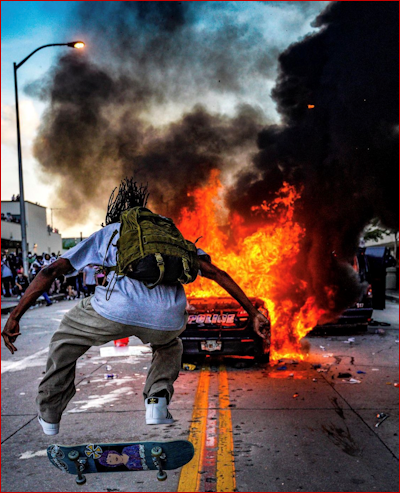 On the other hand, if you are a cop, a civic leader, or a Christian, kneeling and accepting the Woke credo will do nothing to make you any less worthy of public contempt and censure.After all, this is a religion that has no doctrine of atonement, no concept of forgiveness, and no possibility of real redemption. The recent demonstrations and riots made clear that no matter how frequently they use the word, reconciliation is not the real goal of Wokeism.In short, the Woke worldview is impossible to blend with gospel truth—and its inevitable drift will take today's wanna-be-Woke evangelicals exactly where the social gospel of Walter Rauschenbusch took the mainline denominations in the twentieth century: into rank theological liberalism and unbelief.The notion that the gospel can be improved by blending it with Wokeism is sheer folly anyway. The Woke worldview is rooted in secularism—and arguably, Marxism. Its central claims and distinctive jargon are taken not from Scripture but from secular political discourse. It is a canon of doctrine deliberately designed to provoke conflict, prolong resentment, and foster bitterness between different ethnicities. It encourages people to be offended by things that never actually happened to them—while blaming others for sins they did not actually commit. It doles out guilt and shame rather than grace and redemption. Though it is promoted by people who say they oppose ethnic strife, it is a blatantly racist worldview, condemning entire ethnic groups for sins that were committed generations ago by people long dead.All of that hits at the heart of the gospel message of forgiveness, grace, oneness in Christ, and unity in the church. It is as anti-Christian as every other cult or false religion, and faithful followers of Christ should recognize that. On the other hand, if you are a cop, a civic leader, or a Christian, kneeling and accepting the Woke credo will do nothing to make you any less worthy of public contempt and censure.After all, this is a religion that has no doctrine of atonement, no concept of forgiveness, and no possibility of real redemption. The recent demonstrations and riots made clear that no matter how frequently they use the word, reconciliation is not the real goal of Wokeism.In short, the Woke worldview is impossible to blend with gospel truth—and its inevitable drift will take today's wanna-be-Woke evangelicals exactly where the social gospel of Walter Rauschenbusch took the mainline denominations in the twentieth century: into rank theological liberalism and unbelief.The notion that the gospel can be improved by blending it with Wokeism is sheer folly anyway. The Woke worldview is rooted in secularism—and arguably, Marxism. Its central claims and distinctive jargon are taken not from Scripture but from secular political discourse. It is a canon of doctrine deliberately designed to provoke conflict, prolong resentment, and foster bitterness between different ethnicities. It encourages people to be offended by things that never actually happened to them—while blaming others for sins they did not actually commit. It doles out guilt and shame rather than grace and redemption. Though it is promoted by people who say they oppose ethnic strife, it is a blatantly racist worldview, condemning entire ethnic groups for sins that were committed generations ago by people long dead.All of that hits at the heart of the gospel message of forgiveness, grace, oneness in Christ, and unity in the church. It is as anti-Christian as every other cult or false religion, and faithful followers of Christ should recognize that. |
. . . and so much the more as you see the Day approaching.by Phil Johnson
  avin Ortlund has written a blogpost titled "Should Churches in California Defy Government Restrictions? A Response to John MacArthur." Time won't permit me to go through his entire post, but I want to clarify one point that Ortlund gets wrong, because it's a crucial one, and I've seen it repeated several times on Twitter. (I've even had a couple of angry emails from people who think John MacArthur said what Ortlund claims he said.) Since it's the starting point of Ortlund's blogpost, much of what he writes in the piece hinges on his misunderstanding of a partial quote he has pulled from MacArthur.Ortlund writes, for example, "To claim that those complying with the government restrictions 'don't know what a church is and . . . don't shepherd their people' is both unhelpful and unkind" (italics added). MacArthur made no such blanket statement, but Ortlund seems to believe that's what he meant, and Ortlund feels personally targeted by it.Here's what John MacArthur did say, with a little bit of context:Churches are shutting down. Large churches are shutting down until (they say) January. I don't have any way to understand that—other than they don't know what a church is and they don't shepherd their people. But that's sad. And you have a lot of people in Christianity who seem to be significant leaders who aren't giving any strength and courage to the church. They're not standing up and rising up and calling on Christians to be the church in the world.—John MacArthur (2 August 2020)As the context plainly shows, Pastor MacArthur was talking about pastors who are doing what Andy Stanley and JD Greear have done—namely, they have stopped gathering as a church and made small home groups a long-term substitute for congregational worship. And they say they have no intention of re-gathering the whole flock until sometime in 2021.MacArthur's remark was not about masks and social distancing. It wasn't aimed at churches that have continued to gather the flock by moving their services outdoors or off site. And let's be clear: That would exclude Gavin Ortlund from MacArthur's censure. In his blogpost, Ortlund himself says, "Our church has chosen to meet outdoors." Wonderful. He is to be commended for that. But would Pastor Ortlund not actually agree that it would reflect an unbiblical notion of what the church should be if he had given up on the duty spelled out in Hebrews 10:25—which (by the way) Ortlund himself lists first in his list of "four biblical values that should inform our decision-making in this situation"?No one who is making a good-faith effort not to forsake the regular assembly has any cause to feel insulted by John MacArthur's comment. I'm convinced that no one who is listening carefully to what Pastor MacArthur is saying (and what he has said—repeatedly—about Grace Church's response to the indefinite extension of the quarantine in California) has any cause to feel targeted—unless they are arguing that long-term closure of churches is the right response to the pandemic.I admit, it did surprise me last week when Jonathan Leeman, Editorial Director of the 9Marks ministry, indicated he appreciated JD Greear's approach, implying that canceling congregational worship for the rest of the year is a viable (perhaps even better) answer to the quarantine than John MacArthur's decision simply to open the doors of the church and allow the congregation to come. Leeman himself had previously written an excellent article, "The Church Gathered," defending the priority of the congregational assembly. avin Ortlund has written a blogpost titled "Should Churches in California Defy Government Restrictions? A Response to John MacArthur." Time won't permit me to go through his entire post, but I want to clarify one point that Ortlund gets wrong, because it's a crucial one, and I've seen it repeated several times on Twitter. (I've even had a couple of angry emails from people who think John MacArthur said what Ortlund claims he said.) Since it's the starting point of Ortlund's blogpost, much of what he writes in the piece hinges on his misunderstanding of a partial quote he has pulled from MacArthur.Ortlund writes, for example, "To claim that those complying with the government restrictions 'don't know what a church is and . . . don't shepherd their people' is both unhelpful and unkind" (italics added). MacArthur made no such blanket statement, but Ortlund seems to believe that's what he meant, and Ortlund feels personally targeted by it.Here's what John MacArthur did say, with a little bit of context:Churches are shutting down. Large churches are shutting down until (they say) January. I don't have any way to understand that—other than they don't know what a church is and they don't shepherd their people. But that's sad. And you have a lot of people in Christianity who seem to be significant leaders who aren't giving any strength and courage to the church. They're not standing up and rising up and calling on Christians to be the church in the world.—John MacArthur (2 August 2020)As the context plainly shows, Pastor MacArthur was talking about pastors who are doing what Andy Stanley and JD Greear have done—namely, they have stopped gathering as a church and made small home groups a long-term substitute for congregational worship. And they say they have no intention of re-gathering the whole flock until sometime in 2021.MacArthur's remark was not about masks and social distancing. It wasn't aimed at churches that have continued to gather the flock by moving their services outdoors or off site. And let's be clear: That would exclude Gavin Ortlund from MacArthur's censure. In his blogpost, Ortlund himself says, "Our church has chosen to meet outdoors." Wonderful. He is to be commended for that. But would Pastor Ortlund not actually agree that it would reflect an unbiblical notion of what the church should be if he had given up on the duty spelled out in Hebrews 10:25—which (by the way) Ortlund himself lists first in his list of "four biblical values that should inform our decision-making in this situation"?No one who is making a good-faith effort not to forsake the regular assembly has any cause to feel insulted by John MacArthur's comment. I'm convinced that no one who is listening carefully to what Pastor MacArthur is saying (and what he has said—repeatedly—about Grace Church's response to the indefinite extension of the quarantine in California) has any cause to feel targeted—unless they are arguing that long-term closure of churches is the right response to the pandemic.I admit, it did surprise me last week when Jonathan Leeman, Editorial Director of the 9Marks ministry, indicated he appreciated JD Greear's approach, implying that canceling congregational worship for the rest of the year is a viable (perhaps even better) answer to the quarantine than John MacArthur's decision simply to open the doors of the church and allow the congregation to come. Leeman himself had previously written an excellent article, "The Church Gathered," defending the priority of the congregational assembly. In the discussions currently taking place in various Internet forums, it seems there is no shortage of church leaders who, faced with the pragmatic difficulties of the recent pandemic, have adopted the view that it's just fine for a pastor to make plans not to gather the flock at all for the better part of a year. Those who think that way ought to feel the sting of John MacArthur's rebuke. The prevalence of such thinking among evangelicals is a disturbing reality, and one that shouldn't be glossed over or downplayed just because someone's feelings might accidentally get hurt.MacArthur was absolutely right in what he said. Those who think closing churches for the remainder of the calendar year is a good plan frankly don't have a biblical understanding of what the church is to be. The fact that so many in current positions of church leadership don't see that sets up a scary scenario for the future of the evangelical movement. In the discussions currently taking place in various Internet forums, it seems there is no shortage of church leaders who, faced with the pragmatic difficulties of the recent pandemic, have adopted the view that it's just fine for a pastor to make plans not to gather the flock at all for the better part of a year. Those who think that way ought to feel the sting of John MacArthur's rebuke. The prevalence of such thinking among evangelicals is a disturbing reality, and one that shouldn't be glossed over or downplayed just because someone's feelings might accidentally get hurt.MacArthur was absolutely right in what he said. Those who think closing churches for the remainder of the calendar year is a good plan frankly don't have a biblical understanding of what the church is to be. The fact that so many in current positions of church leadership don't see that sets up a scary scenario for the future of the evangelical movement. |
For over 200 days an evangelical congregation in the German state of North Rhine-Westphalia has been providing "church asylum" to a Vietnamese Christian amid fears he may be deported by local German authorities, news reports said Sunday, September 3.
|
Mexican authorities have detained a group of men for their alleged involvement in killing three native Indian Christians and seriously injuring six children of the same evangelical family in the country's Chiapas state, BosNewsLife established Wednesday, September 10.
|
Some 20 evangelical Christians, most of them children in a troubled town of Mexico’s Guerrero State, were homeless Saturday, February 23, after they were reportedly expelled by authorities for their refusal to participate in festivals honoring Catholic saints.
|



 Links
Links  Articles
Articles  Blogs
Blogs  Videos
Videos  News
News  Colors
Colors 

 New links
New links

